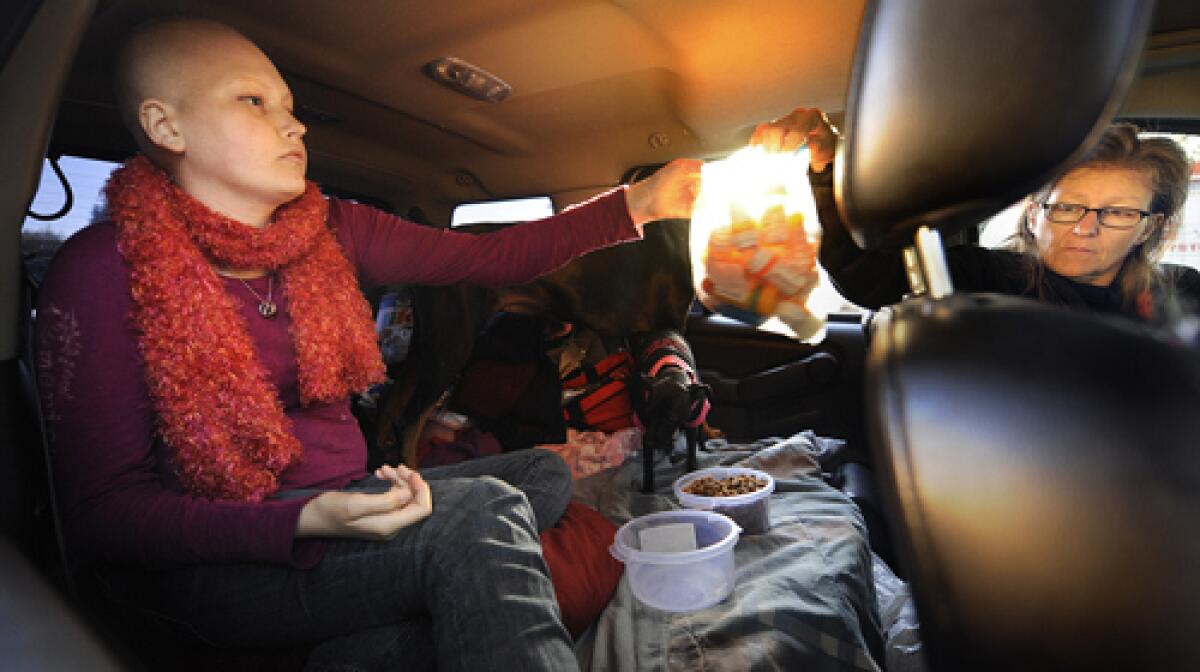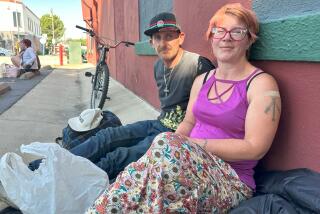They’re living with cancer and little else

- Share via
So you think you’ve got it bad this holiday season? Here’s a story that will put things in perspective for you, no matter how grim your job prospects or how invisible your shrinking retirement fund.
The other day, at their invitation, I met Kerry Himmel, an unemployed truck driver, and her 16-year-old daughter, Destiny, at a McDonald’s on Ventura Boulevard in the San Fernando Valley.
But they weren’t there to eat. That’s where they live.
For about two years, mother and daughter have been anchored in that McDonald’s parking lot, living in their Ford Explorer and avoiding eviction by moving now and then to a nearby Ralphs parking lot. They favor the McDonald’s, though, because there’s a bathroom with an outdoor entrance.
As if that weren’t miserable enough, the situation got much, much worse in April.
“Whenever I stood up, things started getting blurry for a second,” said Destiny.
“You’d have to brace yourself,” her mother added.
Then Destiny was hit with headaches that went from bad to excruciating. Late one night, Kerry rushed her daughter to the Kaiser Permanente Medical Center emergency room in Woodland Hills, where the diagnosis was devastating.
“Destiny has high-risk acute leukemia,” says Dr. Susan Storch, an oncologist and hematologist who told me there’s about a 70% survival rate with an intense treatment approach that takes about 2 1/2 years.
Storch knew the Himmels were homeless, so she kept Destiny in the hospital for several weeks even though the teen wasn’t a Kaiser member. Patients need rest and comfort in an environment as germ-free as possible, Storch said, and the back of an SUV doesn’t fit that bill. The doctor tried to set up housing for them, but Kerry Himmel turned it down -- for reasons I’ll explain later.
After her initial stint at Kaiser, Destiny started outpatient treatment at Childrens Hospital Los Angeles, where Medi-Cal covers her several visits a week -- for chemotherapy, spinal taps, pain therapy and other services. Then it’s back to the McDonald’s and the cramped quarters of the Explorer. Kerry sleeps in the driver’s seat, and Destiny, who is often exhausted and in pain, stretches out in the cargo area.
The nights lately have been frigid, but she says the body heat from her two dogs -- Rugrat and Gidget -- helps keep her warm, even though “they steal my blankets.”
On the day I went to meet them, Kerry helped her daughter out of the truck and handed her a cane, and Destiny took slow, careful steps toward the restaurant so we could sit and talk. She’s tall, with pale blue eyes and a sweet face that’s swollen from steroid treatment.
Living in the truck, they said, is something they’re used to. Kerry and Destiny have spent most of the last 10 years living in vehicles, beginning back in their home state of Michigan.
“It’s the economy,” said Kerry, but there’s a little more to it than that.
Her family was always pretty dysfunctional, said Kerry, so she couldn’t rely on help from relatives, many of whom had their own problems. And she had nothing much better to say about Destiny’s father, who has long been out of the picture.
Kerry and Destiny moved west figuring job prospects would be better, and if they remained homeless, at least it would be warmer here.
I checked with Dallas Berry, the Himmels’ pastor back in Michigan, and he said the Himmels had kept their homelessness a secret even from him while living in Michigan. He learned about it after they left, and also learned that Destiny “was very embarrassed” by it.
“I’m praying for them,” Berry said.
When they moved to California, Kerry Himmel got a truck driving job that lasted several months but didn’t get them out of their hole. She quit to look for something better, and almost immediately, Destiny got sick.
Now, Kerry has no time to job hunt because she’s too busy taking care of Destiny. She’s way behind on the car payments, has credit card companies hounding her, and gets by on roughly $500 a month in food stamps and government aid. She and Destiny collect El Pollo Loco coupons, which cut the price of a salad or burrito to 63 cents. At night, they read or listen to the radio, and Destiny studies as part of a home-school program.
Kerry said her calls to social service and church groups in search of housing have led to one dead end after another, but they have made at least one good friend.
“They’re such wonderful people,” said Cathy Johnson, who manages Personal Storage in North Hollywood, where the Himmels keep some of their belongings. Johnson lets the Himmels use the bathroom and microwave in her office, and she recently faxed out pleas for help on behalf of the Himmels, including one to the L.A. Times.
“I’m not the type to ask anyone for anything,” Kerry said over coffee in the McDonald’s.
But she’s desperate, she admitted, and feeling torn up over her inability to provide basic human needs to a daughter fighting cancer. As she spoke, fingering two medallions she wears to bring prosperity and health, her daughter began sobbing.
“This is embarrassing,” she said.
“There’s nothing to be embarrassed about,” her mother said.
“I don’t want people to look down on me or think they have to pity me,” said Destiny, who wore a knit cap. The chemo has made her temporarily bald.
Kerry confessed that at Childrens Hospital, she fibbed about her circumstances, telling a social worker that she and Destiny are staying with friends. She feared that if she said they were living in the truck, Destiny would be taken from her and placed in foster care.
It wasn’t my place to tell them how to run their lives. But as I see it, a kid fighting cancer shouldn’t be living in a truck. So I suggested, diplomatically, that maybe foster care would be for the best, at least temporarily.
“No, I can’t go through that,” Destiny sobbed. “She’s all I have, and I won’t make it. . . . She’s a great mom and my best friend.”
Once this column is printed, I told Kerry, Childrens Hospital is going to know they’re homeless. That’s true, she said. But she hoped someone would see the story and offer temporary housing, and then there’d be no issue for the hospital.
“We’re really good people, but I don’t want to live like this anymore,” Kerry said, her voice breaking. “I’ve got the best kid in the world, and the most important thing is that we’re together.”
On Thursday afternoon, Destiny had a pain therapy session at Childrens Hospital. While I was there with her and Kerry, I got an unrelated e-mail from Andy Bales, who runs the Union Rescue Mission and Hope Gardens, a transitional residence for formerly homeless women and children located in the northern foothills of the San Fernando Valley.
I e-mailed him back about the Himmels and asked if he might have a spare room. Bales checked and said he can accommodate the Himmels, at least temporarily. Kerry Himmel told me she’d take a look at Hope Gardens this week, and at any other offers that come her way.
I would certainly hope so. On Saturday, I was contacted by John Horn, an L.A. Family Housing official who read the early edition of this column and wanted me to know the Himmels had been offered housing in the spring and turned it down.
Kerry Himmel admitted that was true but said Destiny was too shaky to handle the stairs at the apartment they were offered. Kerry was also concerned about subjecting her sick daughter to germs in a public place with transitional residents, and she doubted she could commit to meetings with a case manager and classes on subjects such as money management while she was shuttling Destiny to frequent medical appointments.
I understand, but would any of those inconveniences have been as bad as living in an SUV and using a fast-food restaurant bathroom? In my experience, people who’ve been homeless a long time lose perspective and a degree of rational judgment. It’s not at all uncommon, said Horn, who explained that after years on the streets, people become focused on daily survival and are so accustomed to their routines that they fear any radical change.
Let’s not forget, though, that this case involves a teen with leukemia. Destiny’s current doctor, John Quinn, told me his young patient has been through the hardest part of the treatment and her cancer is in remission.
But he also said that she needs to be in a safe, warm home as she continues her fight, with chemo treatments expected to continue through July of 2010.
For Destiny’s sake, the Himmels need to get out of that truck, or at least Destiny does. The sooner the better.
More to Read
Sign up for Essential California
The most important California stories and recommendations in your inbox every morning.
You may occasionally receive promotional content from the Los Angeles Times.











